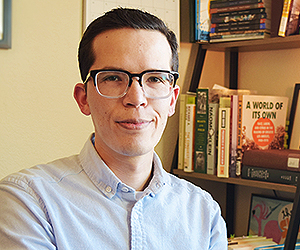 Ford Foundation Predoctoral Fellowship
Ford Foundation Predoctoral Fellowship
Ivan G. Soto, Interdisciplinary Humanities Ph.D. student
What does it mean to you to receive a Ford Predoctoral Fellowship?
As a first-generation, Latino student from Southern California’s Imperial Valley, this means so much to me and my community. Receiving a Ford Foundation Predoctoral Fellowship demonstrates promise in my scholarship and future in academia. It also recognizes the value in interdisciplinary programs like Interdisciplinary Humanities (IH) and illustrates potential in current and prospective IH graduate students.
To me, the fellowship represents more than a prestigious network and time to complete my dissertation; it is an investment in Imperial Valley’s future — a catalyst for prosperity in the region.
Mentors past and present have helped me overcome structural barriers to be here today, and I am committed to advocating for those who have faced similar obstacles. Through time, funding, network and opportunity, the Ford fellowship will help me do this important work.
How much was the award and over how many years?
The Ford Foundation Predoctoral Fellowship provides an annual stipend of $27,000 for three years. As a Ford Fellow, I’ll have access to mentorship from former fellows through a network of regional liaisons. Additionally, there will be an opportunity to attend the Conference of Ford Fellows.
What attracted you to UC Merced for graduate school?
I was drawn to UC Merced through an opportunity to work with my academic advisor, Professor Mario Sifuentez. When I was an undergrad at Humboldt State University, I applied to programs in which I could apply my interdisciplinary background in environmental studies. Like most prospective graduate students, I’d reach out and share my research project proposal with potential advisors to find a good fit. Through that process, I connected with Professor Sarah Wald at the University of Oregon who saw potential in my project—she thought I would fit well with someone she knew from graduate school at Brown University. She put me in contact with Professor Sifuentez. I read up on Sifuentez’s work, reached out, and knew I had found the perfect match.
Fun fact: I was born in Merced. My father, Candelario Soto, was a farmworker and our family lived in a labor camp in Los Banos before relocating to the Imperial Valley along the U.S.-Mexico border. In a way, coming back to Merced felt like coming home.
What is your career plan after graduating with your Ph.D.?
My spouse, Shiloh, and I are both humanities Ph.D. students and we plan to pursue careers in academia. We've had this dream since we were undergraduates at Humboldt State and our goal is to become tenure-track professors in an interdisciplinary program, such as environmental studies or ethnic studies, with an emphasis in history.
The students I have worked with as a teaching assistant for the Department of History and Critical Race and Ethnic Studies are brilliant. They inspire me to continue my work in ensuring that today’s young people have the necessary tools to make a more just future possible.
I am thankful for the guidance I’ve received from faculty members in the Department of History and Critical Race and Ethnic Studies at UC Merced and the Environmental Studies program at Humboldt State University (HSU), School of Social Sciences, Humanities and Arts staff, and peers in the Interdisciplinary Humanities Graduate Group. I am especially thankful for the support I received on my application from professors Sifuentez, Sarah Jaquette Ray (HSU), Kevin Dawson, Kit Myers and David Torres-Rouff.



